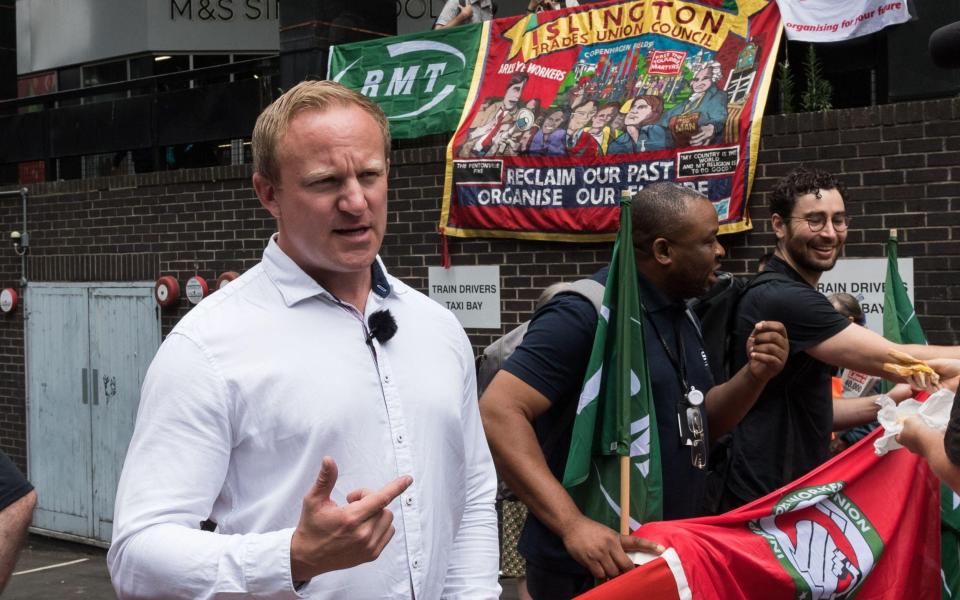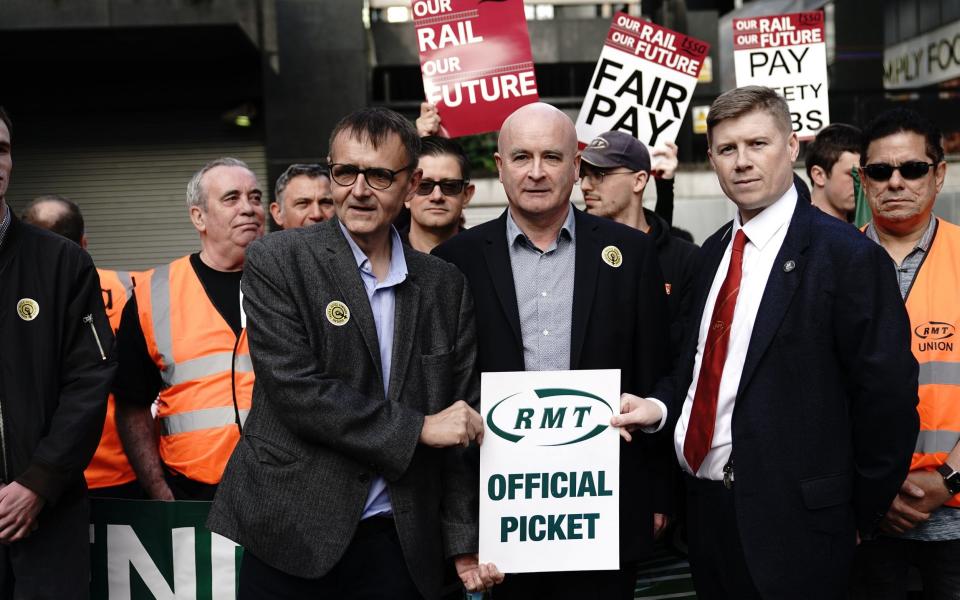Keir Starmer sacks Angela Rayner’s shadow minister boyfriend for joining rail strike picket line

Sir Keir Starmer sparked a row with the unions and the Left-wing of the Labour Party on Wednesday after sacking Angela’s Rayner’s boyfriend for appearing on a rail strike picket.
Sam Tarry was fired from his role as a shadow transport minister after publicly backing the rail strikes and giving a round of media interviews without permission from Labour headquarters.
The strikes brought much of the UK’s rail network to a standstill, with just one in five trains running on half of the network and additional delays on the London Underground.
Last month, Sir Keir banned payroll Labour MPs from appearing on picket lines, arguing that it was not the job of MPs to engage in industrial disputes but to attempt to resolve them at a political level.
But while six frontbenchers were reprimanded for appearing on picket lines last month, Labour sources indicated that Mr Tarry had been sacked because he had given unauthorised media interviews and refused to abide by the shadow cabinet’s collective policy on the strikes.
Mr Tarry is in a relationship with Angela Rayner, a former union representative and Labour’s deputy leader, following her separation from her husband Mark, who was also a union official.

Mr Tarry declined to directly criticise Sir Keir’s leadership on Wednesday, but warned that Britain’s union barons were "fuming" about the decision to sack him and were now on a "direct collision course with the Labour Party".
His sacking looks set to further inflame Labour’s battle with the unions, after several withdrew funding and disaffiliated from the party after it lurched to the Right under Sir Keir’s leadership.
Mr Tarry said his departure would not be the last from Sir Keir’s top team, as other Labour MPs are "faced with a choice of doing nothing, saying nothing or backing the people they view as responsible in some ways for having supported them into Parliament".
"I think that if this isn't tackled properly, there's going to be a real danger that it won't just be me that is sacked," he told LBC.
"I think you'll see dozens and dozens of shadow ministers across the whole country."
The Telegraph understands at least one shadow cabinet minister has privately told Sir Keir that shadow ministers should be allowed to participate in pickets, pointing to the party's history as the political arm of the trade union movement.

Mick Lynch, the general secretary of the RMT union, accused Sir Keir of abandoning working class voters and getting in a "pickle" over the strikes.
"Most of the MPs in the Labour Party want to support us instinctively and naturally because they are from the trade union movement, every one of them," he said.
Sharon Graham, the general secretary of Unite, said Mr Tarry’s sacking was an "insult to the trade union movement", adding: "Juvenile attacks on trade unionists will do absolutely nothing to further Labour’s prospects for power."
Manuel Cortes, the general secretary of the TSSA, said his organisation was "ashamed of the actions of the Labour Party leadership", while the Left-wing campaign group Momentum condemned a "shameful decision which goes against the founding mission" of the party.
Several Left-wing Labour MPs and commentators defended Mr Tarry’s actions, but Ms Rayner did not comment on her partner’s departure from the front bench.
Grant Shapps spent more time on his doomed leadership bid than on resolving the strikes. It’s a serious dereliction of duty.
Labour will always defend the right of working people to organise and withdraw their labour - to stand up for services, public safety, defend jobs & pay.— Angela Rayner 🌹 (@AngelaRayner) July 27, 2022
She tweeted in support of striking workers, saying: "Labour will always defend the right of working people to organise and withdraw their labour - to stand up for services, public safety, defend jobs and pay."
Ms Rayner and Mr Tarry were pictured together leaving her London home earlier this year, and at Glyndebourne for a performance of The Marriage of Figaro last month.
Spokesmen for both declined to comment on their relationship or how long they have been together.
The RMT was criticised for continuing its industrial action on Wednesday despite an offer of an 8 per cent pay increase over two years.
Grant Shapps, the Transport Secretary, said union bosses had been "incredibly militant" about the strikes and called for reforms to working practices.
"We have, in this country, a railway that still works, in many cases, on rules and regulations from the '70s, the '60s, the '50s and in one case from 1919," he told the BBC, adding: "We simply have to modernise it."

One group of friends and family from Hartlepool on holiday in London told The Telegraph they had been forced to spend almost £800 on a taxi to take them 266 miles home.
The last train from London to Edinburgh departed at 2pm, after the rest of the services were cancelled. While London Underground passengers faced knock-on delays from National Rail trains that use the same tracks.
The disruption looks set to continue after members of the Aslef union announced they would walk out on August 13 in a row over pay.
The union says train operators "failed to make a pay offer to help members keep pace with the increase in the cost of living".
Mr Lynch called for a general strike in retaliation if legislation is introduced to curb walkouts. He said it would be "the biggest resistance mounted by the entire trade union movement".
There will also be industrial action by August 18 and 20 by the RMT and the TSSA, which represents ticket office workers.
Mick Whelan, the general secretary of Aslef, insisted that "strikes are always the last resort", but one Labour source warned of a "summer of discontent" to follow with further strikes from doctors, nurses and other public sector workers.
In response, The Telegraph understands that ministers are launching a crackdown on taxpayer funding of trade union "militants" as they move to limit the amount of public funds spent on union activities.
Public sector workers - including local authority staff, quango officials, police and teachers - can take paid time out from their duties to engage in trade union activities, under an arrangement known as "facility time".
But the Government is now drawing up new legislation aimed at limiting the amount of taxpayer money that can be spent on it.
"Unions are taking taxpayers for a ride," one Government source said. "Lots of members of the hardworking public may not be aware that they are inadvertently subsidising trade union militants."
The TaxPayers’ Alliance recently revealed that trade union officials could receive up to £199 million a year in "hidden subsidies" funded by the public purse.
A letter seen by The Telegraph from Heather Wheeler, the Cabinet Office minister, explains the Government’s intention to implement guidance for all public sector bodies on the "proportionate use of facility time to ensure value for money to the taxpayer".

 Yahoo Sports
Yahoo Sports 